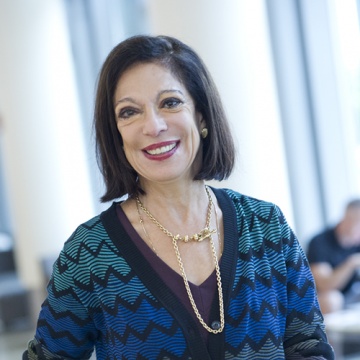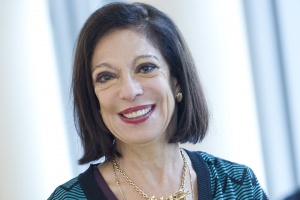
Nazli Choucri
Professor of Political Science
International relations; cybersecurity; international conflict; cyberpolitics; global accord; sustainable development; cyberwar.
Biography
Nazli Choucri is a Professor of Political Science, Senior Faculty at the Center for International Studies (CIS), and Faculty Affiliate at the MIT Institute for Data, Science, and Society (IDSS). She focuses on cyberpolitics and computational social sciences in international relations—exploring emergent dynamics in three overarching “spaces” of 21st century politics, i.e. (i) traditional geo-political arena, (ii) natural environment, and (iii) constructed domain of cyberspace. She examines sources of conflict and threats to security, on the one hand, and strategies for sustainability and global accord, on the other. She is the author and/or editor of twelve books, most recently Cyberpolitics in International Relations (2012) and International Relations in the Cyber Age: The Co-Evolution Dilemma, with David D. Clark (2019).
Elected Fellow of the American Association for the Advancement of Science (AAAS), Professor Choucri is the architect and Director of the Global System for Sustainable Development (GSSD), an evolving knowledge system centered on sustainability problems and solution strategies. She created and directs CyberWorld@MIT and the related knowledge and networking system CyberIR@MIT. Both initiatives are rooted in the cyber-inclusive view of international relations introduced by the MIT-Harvard project on Explorations in Cyber International Relations (ECIR), for which she was Principal Investigator.
Professor Choucri served as General Editor of the International Political Science Review, and for two terms on the Editorial Board of the American Political Science Review. She was on the Science Board of the Santa Fe Institute, also for two terms. She is a founding member of the Artificial Intelligence World Society (AIWS) and is on the Board of the Boston Global Forum.
Research
International Conflict and CyberPolitics Professor Choucri works in the areas of international relations, conflict and violence and the international political economy with a focus on cyberspace and the global environment. Her early research concentrated on sources and consequences of international conflict and warfare in theoretical and empirical contexts. Her current research is on cyberpolitics in international relations focusing on linking integrating cyberspace into the fabric of international relations. Special attention is on cybersecurity, the power of knowledge, and the changes in political and strategic implications of cyber access worldwide. In collaboration with the late Robert C. North, Stanford University, Choucri developed the theory of lateral pressure in international relations, including its analytical and quantitative representation, and initial validation. Lateral Pressure refers to the propensity to expand behavior outside national boundaries. The theory focuses on the sources and consequences of such propensity.
Sustainability and Cyberspace Directing the GSSD initiative, she overseas an evolving multilingual e-knowledge networking system (English, Chinese) designed to facilitate the provision and uses of knowledge in transitions to sustainability, while developing system extensions to incorporate cyberspace and capture evolving patterns of conflict and competition therein. The intellectual foundations and implementation strategy are reported in a co-edited book entitled Mapping Sustainability: Knowledge e-Networking and the Value Chain (2007). The basic architecture is now being adapted for application to the cyber arena, drawing on Cyberpolitics in International Relations (in press).
Recent Publications
CyberPolitics in International Relations. The MIT Press, Cambridge, MA. 2012.
Mapping Sustainability: Knowledge e-Networking and the Value Chain. Springer: London. 2007.
"Knowledge Networking for Global Sustainability: New Modes of Cyberpartnering." in D.J. Richards, B.R. Allenby, and W.D. Compton (eds) Information Systems and the Environment. 2001.
"Governance and International Management," in Ted Munn, ed., Encyclopedia of Global Environmental Change. London: John Wiley and Sons. Washington: National Academy Press, pp. 195-210. 2000.
Global Accord: Environmental Challenges and International Responses. Cambridge, Mass.: MIT Press. 1993.
The Challenge of Japan: Before World War II and After. Routledge: London and New York. With R. C. North, and Suzumu Yamakage. 1992.
International Energy Futures: Petroleum Prices, Power, and Payments. Cambridge, Mass.: MIT Press. 1981
Teaching
| 17.181/2 | Sustainable Development: Theory and Policy (Syllabus) |
| 17.405/6 | Seminar on Middle East Politics (Syllabus) |
| 17.410/11 | Globalization, Migration, and International Relations |
| 17.420 | Advances in International Relations Theory (Syllabus) |
| 17.422 | Contending Paradigms of International Political Economy |
| 17.445/6 | International Relations Thoery in the Cyber Age (Syllabus) |
| 17.447/8 | Cyber Politics in International Relations (Syllabus) |
| 17.558 | Political Economy and Technology in the Middle East |
| 17.560 | Technology, Policy, and Sustainability in the Middle East |
News
Biography
Nazli Choucri is a Professor of Political Science, Senior Faculty at the Center for International Studies (CIS), and Faculty Affiliate at the MIT Institute for Data, Science, and Society (IDSS). She focuses on cyberpolitics and computational social sciences in international relations—exploring emergent dynamics in three overarching “spaces” of 21st century politics, i.e. (i) traditional geo-political arena, (ii) natural environment, and (iii) constructed domain of cyberspace. She examines sources of conflict and threats to security, on the one hand, and strategies for sustainability and global accord, on the other. She is the author and/or editor of twelve books, most recently Cyberpolitics in International Relations (2012) and International Relations in the Cyber Age: The Co-Evolution Dilemma, with David D. Clark (2019).
Elected Fellow of the American Association for the Advancement of Science (AAAS), Professor Choucri is the architect and Director of the Global System for Sustainable Development (GSSD), an evolving knowledge system centered on sustainability problems and solution strategies. She created and directs CyberWorld@MIT and the related knowledge and networking system CyberIR@MIT. Both initiatives are rooted in the cyber-inclusive view of international relations introduced by the MIT-Harvard project on Explorations in Cyber International Relations (ECIR), for which she was Principal Investigator.
Professor Choucri served as General Editor of the International Political Science Review, and for two terms on the Editorial Board of the American Political Science Review. She was on the Science Board of the Santa Fe Institute, also for two terms. She is a founding member of the Artificial Intelligence World Society (AIWS) and is on the Board of the Boston Global Forum.
Research
International Conflict and CyberPolitics Professor Choucri works in the areas of international relations, conflict and violence and the international political economy with a focus on cyberspace and the global environment. Her early research concentrated on sources and consequences of international conflict and warfare in theoretical and empirical contexts. Her current research is on cyberpolitics in international relations focusing on linking integrating cyberspace into the fabric of international relations. Special attention is on cybersecurity, the power of knowledge, and the changes in political and strategic implications of cyber access worldwide. In collaboration with the late Robert C. North, Stanford University, Choucri developed the theory of lateral pressure in international relations, including its analytical and quantitative representation, and initial validation. Lateral Pressure refers to the propensity to expand behavior outside national boundaries. The theory focuses on the sources and consequences of such propensity.
Sustainability and Cyberspace Directing the GSSD initiative, she overseas an evolving multilingual e-knowledge networking system (English, Chinese) designed to facilitate the provision and uses of knowledge in transitions to sustainability, while developing system extensions to incorporate cyberspace and capture evolving patterns of conflict and competition therein. The intellectual foundations and implementation strategy are reported in a co-edited book entitled Mapping Sustainability: Knowledge e-Networking and the Value Chain (2007). The basic architecture is now being adapted for application to the cyber arena, drawing on Cyberpolitics in International Relations (in press).
Recent Publications
CyberPolitics in International Relations. The MIT Press, Cambridge, MA. 2012.
Mapping Sustainability: Knowledge e-Networking and the Value Chain. Springer: London. 2007.
"Knowledge Networking for Global Sustainability: New Modes of Cyberpartnering." in D.J. Richards, B.R. Allenby, and W.D. Compton (eds) Information Systems and the Environment. 2001.
"Governance and International Management," in Ted Munn, ed., Encyclopedia of Global Environmental Change. London: John Wiley and Sons. Washington: National Academy Press, pp. 195-210. 2000.
Global Accord: Environmental Challenges and International Responses. Cambridge, Mass.: MIT Press. 1993.
The Challenge of Japan: Before World War II and After. Routledge: London and New York. With R. C. North, and Suzumu Yamakage. 1992.
International Energy Futures: Petroleum Prices, Power, and Payments. Cambridge, Mass.: MIT Press. 1981
Teaching
| 17.181/2 | Sustainable Development: Theory and Policy (Syllabus) |
| 17.405/6 | Seminar on Middle East Politics (Syllabus) |
| 17.410/11 | Globalization, Migration, and International Relations |
| 17.420 | Advances in International Relations Theory (Syllabus) |
| 17.422 | Contending Paradigms of International Political Economy |
| 17.445/6 | International Relations Thoery in the Cyber Age (Syllabus) |
| 17.447/8 | Cyber Politics in International Relations (Syllabus) |
| 17.558 | Political Economy and Technology in the Middle East |
| 17.560 | Technology, Policy, and Sustainability in the Middle East |


